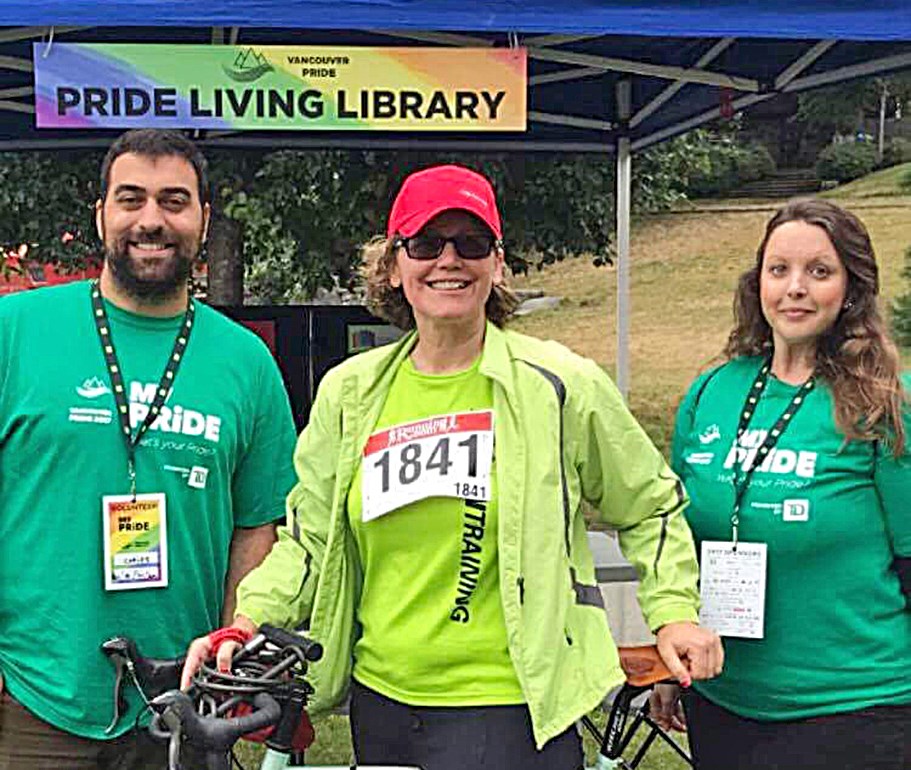A two-spirit First Nations man, a hermaphrodite from Mexico, a former crystal meth addict, a gay man from Montenegro who’s faced numerous death threats, a 30-year-old transgender artist focused on perfecting her Barbie doll-like appearance who’s finally learned how to love herself; these are just some of the diverse and necessary voices in the Pride Living Library.
The project, currently in its first year, aims to gather stories from Vancouver’s LGBTQ+ community and share them with the public, giving voice to marginalized and often hidden histories full of powerful truths. Eight history-holders workshopped and then shared their stories, which were recorded on film and can be viewed at various Pride events throughout the Lower Mainland, including the Vancouver Pride Parade this weekend (Aug. 6).
Susan MacRae, a local writer, instructor and artist, offers one of these voices. She decided to share her experience of working as a home care worker for men with AIDS in the early ’90s. “It was an intense experience. I haven’t really talked about it for 20 years,” she says.
In June of this year, she notes, Trump did not declare Pride month, and she feels there seems to be a renewed threat to gay rights. “I thought, I better fight back.”
As MacRae puts it, there is a whole generation that doesn’t know “how terrible people were.”
In 1993, she decided to move down to Oakland to live with her partner. It was the height of the AIDS crisis and prejudice against homosexuality was so rampant that the US had only just lifted the ban on deviancy. Prior to 1992, they could deport a person for homosexual activity, MacRae points out.
“One day, we were driving and I saw a man who was dying of AIDS looking for food in the dumpster.” The image stayed with her and, soon after, she started volunteering at the Center for AIDS. She remembers reading the gay newspapers: “Page after page of men who had died of AIDS. Xtra Westwas the same at the time – every two weeks it was filled with obituaries of talented intelligent men. A whole generation; my generation.”
The story she chose to tell for the Living Library is about Fred and Robbie, a young Filipino couple in their early 30s that she did home care for. Robbie was dying of AIDS. “He was so vulnerable, so sweet, still a boy in some ways. But he was abandoned; his parents wouldn’t come. They were Catholic and the father was in the military. The mother wanted to come, but his father wouldn’t allow it.”
The reality that someone could be abandoned just because of his sexuality hit home. “I had come out at 22, and I had to accept myself for who I am. When you are around death so much and you see people not accepting, it wakes you up. It teaches you not to be ashamed. I had a great deal of shame at that time, it was overpowering. But I had to accept myself on a profound level.”
MacRae’s brother had died in a tragic accident when she was 20, and being able to care for people who were dying, to provide them some comfort and dignity, was “really good for me. I’m thankful for it. I got to know them on an intimate level very quickly.”
The gay and lesbian community had a complex relationship, but they did help each other, says MacRae. The whole experience was “like living through a war that was happening right in front of you,” but there were also moments of incredible beauty. In her story for the Living Library, she talks about seeing Fred carry Robbie downstairs to the den during the day and up to the bedroom at night. He was down to about 90 pounds and close to death. “Gay relationships were not recognized at all, but that is love. I’ll never forget watching Freddie carry him up the stairs. I saw what real love is.”
• Amy Logan is a Vancouver writer, editor and English instructor with an ear for trends in the arts, community and environment. She is a regular contributor to Metro News, and joins the Westender for the summer to explore the artists, creatives, environmentalists and adventurers who make Vancouver tick.



